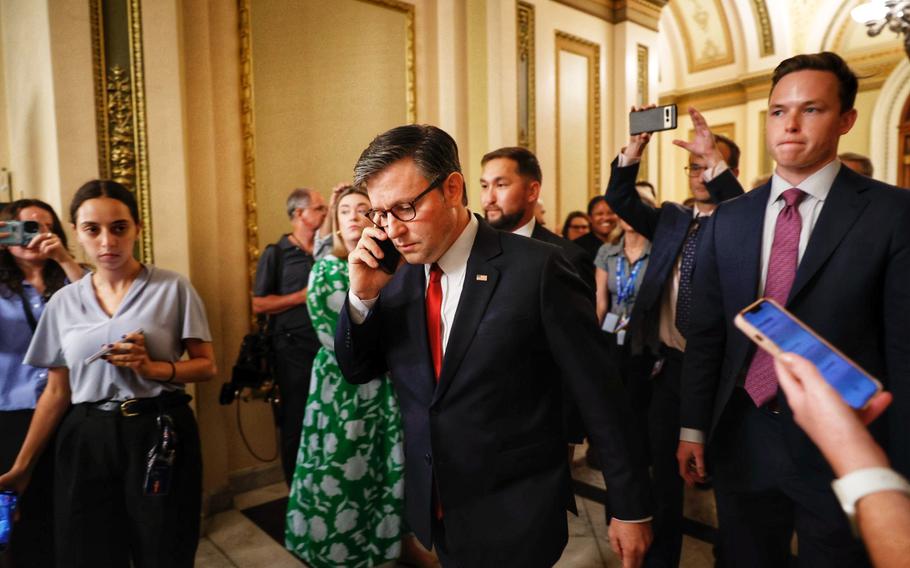House Republicans on Thursday, July 3, 2025, pushed through divisive legislation known as the ‘One Big, Beautiful’ bill, with a 218-214 vote over unanimous Democratic opposition. (Eric Kayne/Stars and Stripes )
WASHINGTON — The House on Thursday passed President Donald Trump’s signature domestic policy bill, extending tax cuts, cutting spending on social safety net programs and giving the Pentagon $150 billion on top of its annual budget.
Republicans pushed through the divisive legislation with a 218-214 vote over unanimous Democratic opposition. They had to rely on a tiebreaking vote by Vice President JD Vance to advance the bill through the Senate earlier this week.
Trump is expected to sign the bill on Friday, meeting his July 4 deadline for the legislation to pass both chambers of Congress. Republicans used a process called reconciliation to bypass Democrats and approve the measure with a simple majority vote.
The sprawling bill will raise spending on defense and immigration enforcement while lowering funding for health and nutrition programs, including eliminating exemptions from work requirements for veterans who rely on food assistance.
An estimated 270,000 veterans, homeless people and former foster children who use the Supplemental Nutrition Assistance Program are expected to be cut from SNAP in a typical month as a result of the bill, according to the nonpartisan Congressional Budget Office.
Some 1.2 million veterans are SNAP recipients.

House Speaker Mike Johnson, R-La., leaves the House chamber on Wednesday, July 2, 2025. (Eric Kayne/Stars and Stripes)
The program now exempts veterans and other groups from rules that require most able-bodied adults without children in their household to work 20 hours per week to receive food benefits more than three months in a three-year period.
Rep. Angie Craig, D-Minn., said many veterans suffer from behavioral or physical health issues connected to their service that can make employment difficult.
“One in three working-age veterans with disabilities isn’t sure where their next meal will come from. One in four working-age veterans who can’t find work is food insecure,” she said. “Our veterans can’t pay for meals with ‘Support the Troops’ bumper stickers, and they can’t eat thoughts and prayers.”
Republicans have said individuals who are physically or mentally unfit for employment would continue to be exempt from work requirements and touted the legislation for rooting out waste, fraud and abuse in government programs.
They also hailed the bill for making critical investments in border security and the military.
The $150 billion for the Defense Department is set to support shipbuilding, refill stockpiles of munitions, jump-start Trump’s Golden Dome missile defense system, bolster the critical minerals supply chain and advance the development of unmanned ships and drones.
Nearly $30 billion is earmarked for growing the naval fleet, $25 billion is designated for the Golden Dome and $9 billion is to be spent on improvements to housing, health care, child care and education for service members, along with increases to allowances and special bonuses.
Military operations on the U.S.-Mexico border would receive $1 billion, $4 billion less than the House had passed in its version of the bill in May.
The allocated funds are meant to be spent within the next decade, but the Defense Department is counting on $113 billion of the money to help pay for its $961 billion budget request for fiscal 2026, which begins Oct. 1.
Defense hawks in Congress have criticized the Pentagon for depending on the one-time injection of funds to pay for major annual priorities that they say should have been funded through the traditional budget process.
Still, they celebrated the boost to the Pentagon’s coffers as good news for a military contending with growing threats from China, Russia, Iran, North Korea and other adversaries seeking to challenge American interests.
“Years of chronic underinvestment in our national security has shattered American deterrence,” said Rep. Mike Rogers of Alabama, the Republican chairman of the House Armed Services Committee. “But that ends today. Because today, with the passage of the ‘One Big, Beautiful’ bill, we begin implementing President Trump’s peace through strength agenda.”
In an op-ed published in Defense One on Wednesday, Rogers and his counterpart in the Senate, Republican Roger Wicker of Mississippi, said the $150 billion infusion needed to be the start of steady increases in defense funding to keep pace with China’s military advances.
“National defense can’t be done on the cheap. But as we spend more, we will spend smarter,” they wrote, noting they will work with Pentagon officials to ensure every dollar is “spent in the right place.”
The legislation requires Defense Secretary Pete Hegseth to audit the way that officials use the reconciliation funds.
Some Democrats assailed Republicans for supporting a redirection of funds from benefits programs such as Medicaid and SNAP to a Defense Department that is pushing a trillion-dollar budget and has never been able to pass an audit.
“You’re worried about someone on SNAP who gets an average of $2 per meal might get $2.75 per meal,” said Rep. Jim McGovern, D-Mass. “But you couldn’t care less when millions of dollars are wasted by defense contractors and cost overruns.”